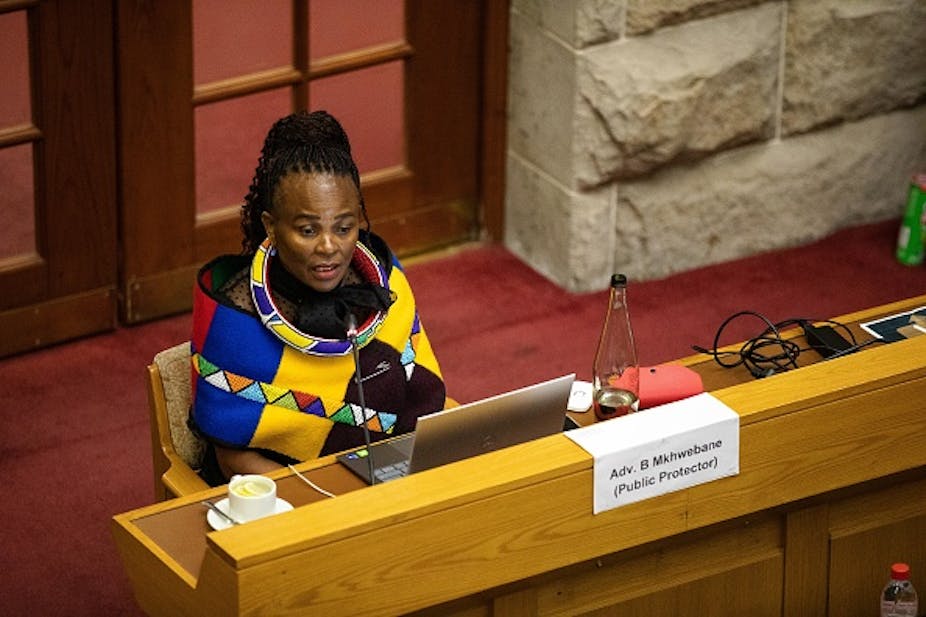The end of apartheid in South Africa in 1994 made it necessary to establish several institutions to underpin the country’s new constitutional democracy.
The office of the public protector was one of them. It was established in 1995 to exercise oversight over governmental power. The constitution grants the public protector autonomy to investigate improper government conduct and maladministration. The aim is to enhance government accountability and responsibility, thus safeguarding the public interest.
The term of the third incumbent, Busisiwe Mkhwebane, who was appointed in 2016, has been mired in controversy. She has faced serious criticism and calls for her removal amid allegations of dishonesty and incompetence. She was suspended on 9 June 2022 and is the subject of an impeachment inquiry.
It’s not the first time the office has been caught up in controversy. Lawrence Mushwana, the second public protector (2002-2009), was perceived by some as biased towards the governing African National Congress. This raised doubts in some quarters about the institution’s independence and impartiality.
Read more: Storm around South Africa's public protector shows robustness, not a crisis
The controversies and their impacts show how important it is to make the right appointment to the position.
I have been teaching and conducting research in organisational psychology and theory for the past decade. My diverse research interests in the areas of professional employee recruitment and selection have provided me with valuable insights into best practices.
In a joint 2021 study we examined the recruitment and selection process of South Africa’s public protector. In our view the process is deeply flawed. It needs an overhaul to ensure it is transparent, professional and free from political bias.
In particular, enlisting the expertise of professionals would make the recruitment and selection process more robust, transparent and fair.
Our analysis highlights the need for a comprehensive approach to the process. It must involve multiple stakeholders and expertise from fields such as law, human resources, and work or organisational psychology.
Fixing the flaws will improve competence and public trust in the public protector’s office.
The public protector
The public protector is one of six institutions created by Chapter 9 of the South African constitution. The office investigates improper conduct in state affairs and public administration.
It is entrusted with monitoring state officials and agencies to promote an effective, ethical and accountable public service. The office plays a vital “government watchdog” role in safeguarding the public interest.
Given the public protector’s crucial role in combating corruption and maladministration, the selection of a “fit and proper” candidate is paramount. Making the right appointment is key for the institution’s effectiveness and integrity.
Flaws in the recruitment process
The constitution outlines the appointment procedures for and functions of the public protector. But it lacks specific guidelines for the recruitment and selection of a suitable candidate. This raises concerns about the fairness of the process and potential political influence.
The Public Protector Act, 1994 also outlines the requirements for appointment. But it too does not provide a clear definition of what constitutes a “fit and proper” person for the role. It lists qualifications such as legal expertise, administrative knowledge and cumulative experience of 10 years in the administration of justice, public administration or public finance.
It doesn’t explain why it emphasises 10 years of experience, or why these specific criteria are important.
The act does not promote transparency in the appointment process. Instead of following a professional recruitment and selection approach, it leaves this to a committee of the national assembly. The committee consists of representatives of various political parties.
Filling the committee with politicians compromises the professional ethics of recruitment and selection. The committee lacks qualifications in human resources or recruitment. It has no training on the process. Yet, it recommends a candidate to be appointed by the president.
The committee has no clear guidelines or criteria for choosing a fit and proper person for the position. It relies on interviews and personal judgments, leaving room for bias and subjective decision making. The committee does not provide its rationale for the qualities considered during the shortlisting of candidates.
What needs to happen
Clear guidelines, competencies and expert input should be established so that a qualified and suitable candidate is appointed for this important role.
The recruitment process should adhere to best practices in human resources. It should use scientific methods to assess candidates’ knowledge, skills and abilities.
Human resources experts can provide insights and expertise in developing the selection criteria, based on job analysis and competency frameworks. They can help develop standardised methods of assessment, including competency-based behavioural assessments. These can be used to evaluate candidates’ qualifications, integrity, reliability, diligence and other required characteristics.
Work or organisational psychology experts would use structured interviews, comprehensive reference checks, and blind or anonymous assessments.
Effectiveness and integrity
The recruitment and selection process for a new public protector started in May. The current incumbent’s term expires in October. The public protector is appointed for a non-renewable seven-year term.
The appointment directly affects the country’s governance and accountability of public officials.
Selection of unsuitable candidates compromises the effectiveness and integrity of the office.
Our research highlights the urgency of addressing these procedural issues so that the public protector can fulfil its role of protecting the public interest, promoting transparency and upholding democratic principles.

